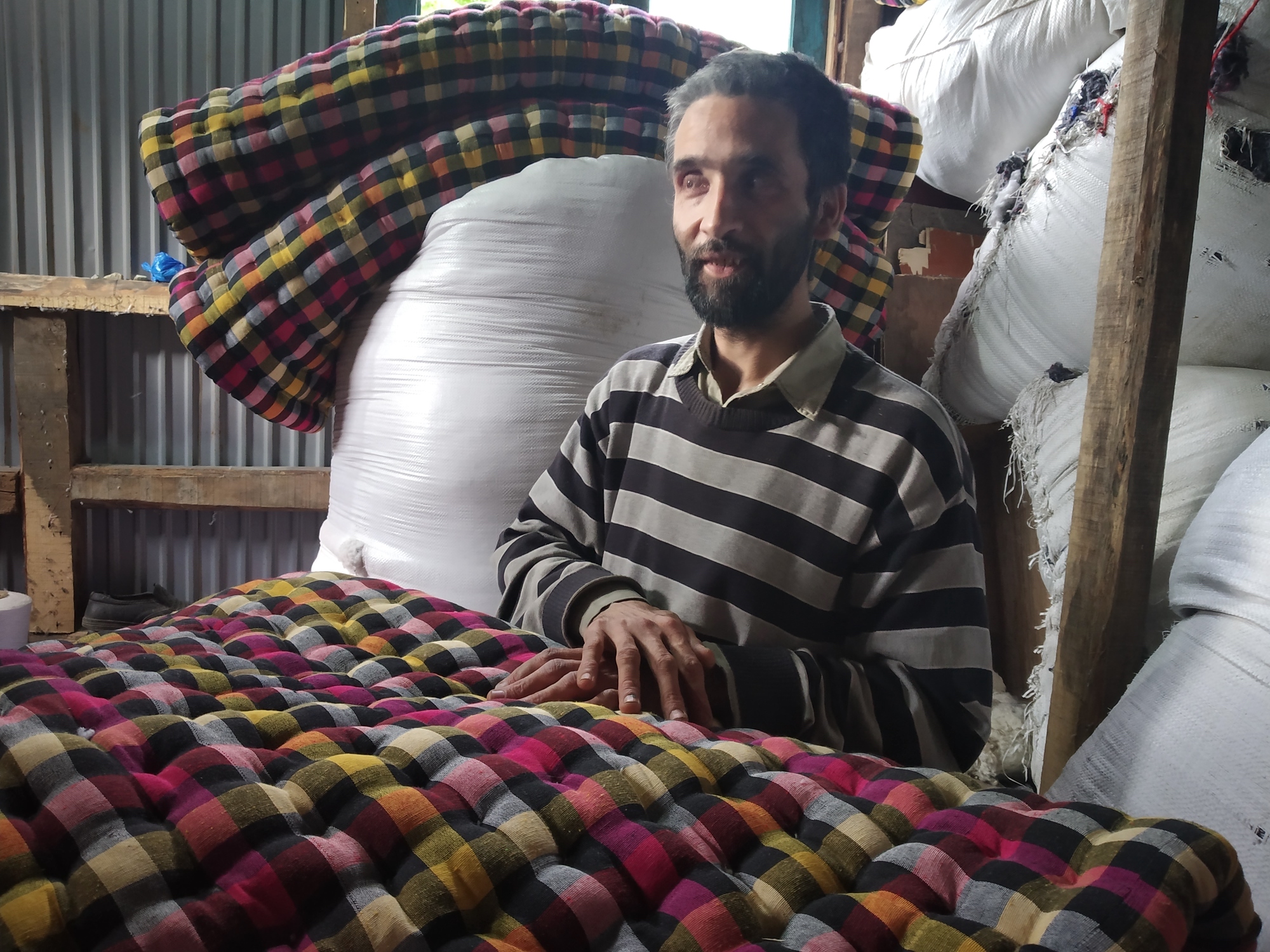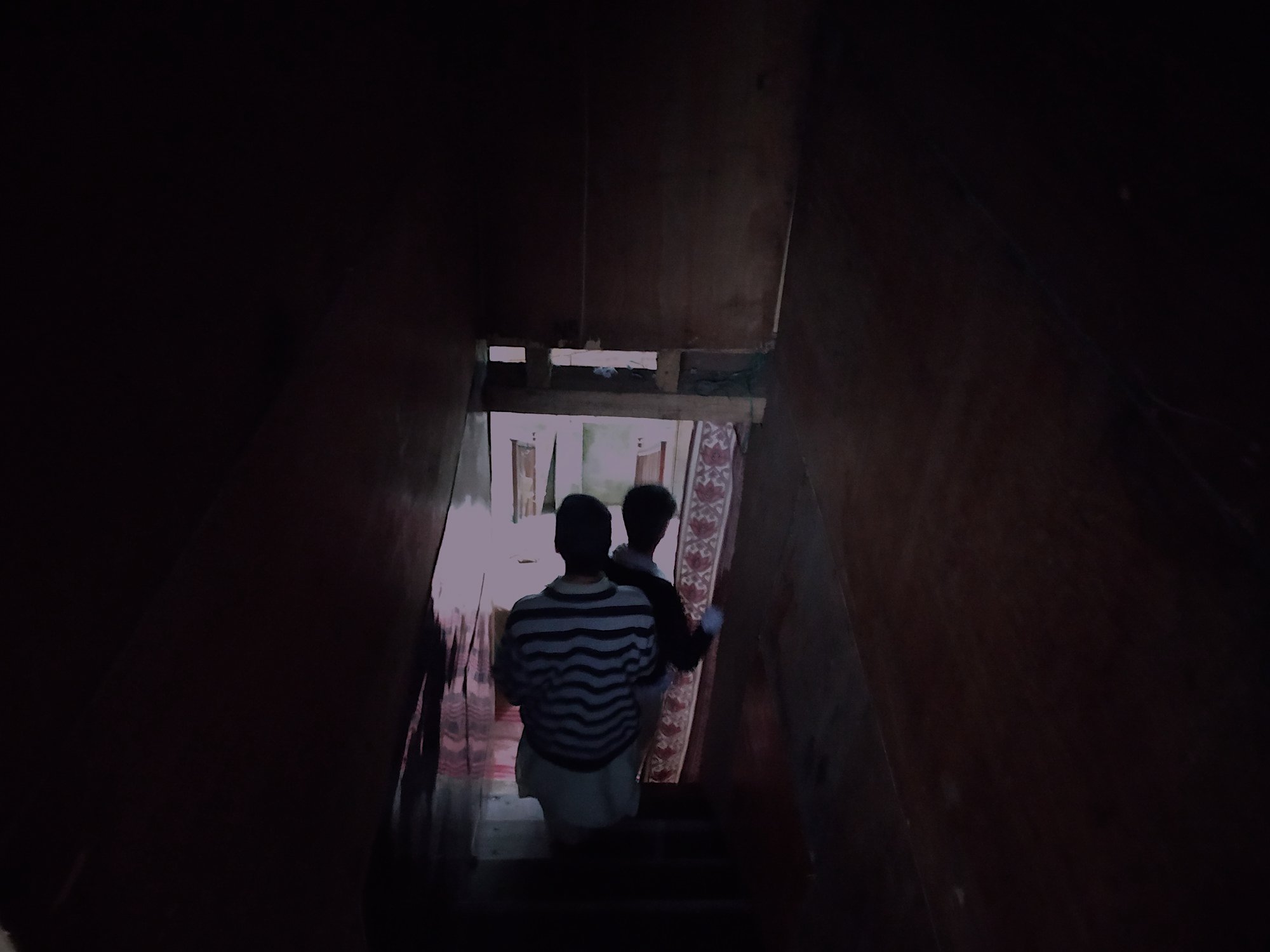

Two brothers, both blind by birth, have been earning their livelihood by stitching quilts and mattresses despite little support from anyone, reports Majid Maqbool
Muhammad Hussain Teli, 35, carefully steps out of the gate of his modest home in Chakbagh, Hazratbal, Srinagar. He extends his hand in greeting and guides me back to his workshop on the third floor of his house. He takes measured but confident steps on the staircase leading up to the top floor. In between, he touches the handrail to keep his balance until he reaches the third floor where he unbolts the door.
It is a small, tin-sheet covered single room. This is where Muhammad Hussain and his brother, Ghulam Nabi, 40, have been stitching quilts, mattresses, and cushions with their bare hands for more than a decade. Having worked hard to ensure that their handmade goods are quality products that can last longer, they’ve never had any complaints from their customers.
Save for some open space in the middle, the room is lined with raw material required for making quilts, mattresses, and cushions. Sacks full of cotton, colourful buffalo check cloth, spools of threads are scattered in the room. Few unstitched, incomplete quilts lie on one side, while the recently made ones are neatly stacked in one corner of the room.
Muhammad Hussain knows where their quilts and tools are in the room. He reaches out, and touches a few recently made goods. Unfolding one of their recently stitched quilts, he sits down to run his fingers over it, showing the painstaking work. He is proud of their livelihood and the agency it gives them. Both, him and his brother, Ghulam Nabi are blind by birth.

Muhammad Hussain, 35, in his workshop in Srinagar, Jammu and Kashmir
Hussain recalls, how they learned the craft from their father, a skilled tailor who would also make quilts and sell them in the market. They would sit beside him and feel the raw material with their hands. Slowly they learnt the needle work using Braille system tools that aided them in sewing.
Since both the Teli brothers couldn’t see since birth, their father took them to several eye specialists and doctors over the years, until he finally resigned to their fate. Nevertheless, he never stopped encouraging them to acquire skills that would help them lead normal lives and not be dependent on anyone, despite their handicap. “He always saw us as equally capable of doing any work as anyone else, whatever we are able to do today is because of him,” says Hussain.
During their childhood, their father would often take them to a local school for differently-abled children, where they would learn with the help of the Braille system. In the early 90s, the Kashmiri Pandit couple who ran the school left the valley putting an abrupt end to their education. The Teli brothers never went back to school and instead focused on acquiring skills in training centres for differently-abled people run by a few NGOs in Srinagar. They also spent a year in a vocational training centre outside the state when they were in their twenties.
In 2006, with some help from their father, they started making quilts and mattresses by setting up a small workshop on the top floor of their home. Soon they were able to earn a meagre livelihood. The brothers recall how their proud father would tell customers that there was no difference in their craftsmanship and his. He would also often help around the workshop but now he’s too old to work.
Although the demand for handmade quilts declined over the years, the brothers still managed to earn enough to support a frugal existence. “Machine-made quilts and mattresses which are brought from outside the state and sold here have also affected our work which is done by hand,” says Hussain, “but our handmade quilts are of better quality. You won’t have any complaints if you buy them from us,” he emphasises. The two brothers also make file covers, envelops, paper bags, and parcels, among other items.
Things are starting to get tough now, Nabi recently underwent a gallbladder surgery and the doctors have advised him to take a year off from physical labour. Now most of the sewing is done by his younger brother, Hussain, who can’t cope with it alone. As a result, the profits have halved and are not enough to keep the whole family afloat. The elder brother is hoping to get back to work soon.

The Teli brothers make their way down from their workshop
They also say that they didn’t get any significant help from the state government over the years. Nabi says when the former chief minister Mehbooba Mufti visited their area in 2004 during election campaigning, they were told to work as labourers when they sought some help from her. “We just get some 1000 rupees monthly allowance from social welfare department and that too doesn’t come in regularly,” he rues. “The governments and politicians here want people like us to beg and be dependent on others,” he says, visibly angry,. “But it is they who come begging for votes from people like us from time to time.”
“If more of our people buy our goods and support our work, we won’t need any other help then,” says Hussain and re-iterates, “we can make better quality quilts than any machine made quilts and mattresses that are sold in the market here.” Nabi is reflective and only says that he has no hopes from the government, “we don’t want their support now.”
The two brothers have always wanted to open a training centre in a better space where they can help more people like them to earn their own livelihood. “This room is not suitable for this kind of work,” says Hussain, explaining that rainwater often seeps into the room which can be damaging to their raw material. Despite his brother’s ailment, which has slowed down their work and income, Hussain is hopeful that they’ll pick up right where they left off and this is all but a tiny glitch in their plans.
To place orders with the Teli brothers, tweet to the author @MaqboolMajid